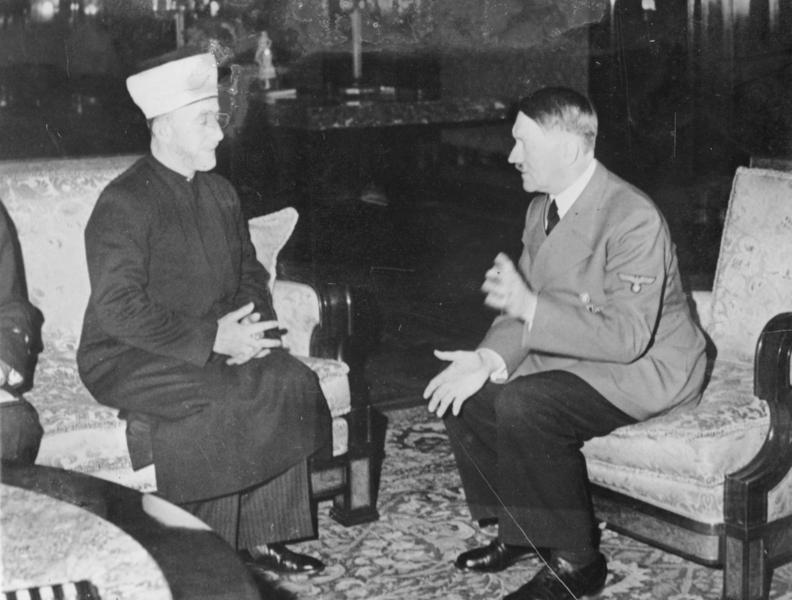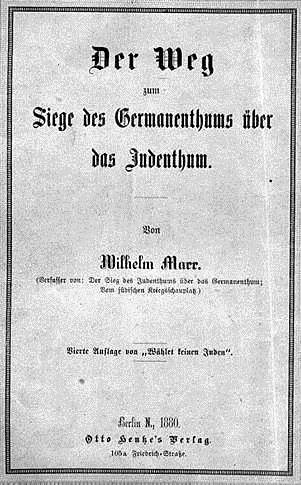|
Anti-semitic
Antisemitism (also spelled anti-semitism or anti-Semitism) is hostility to, prejudice towards, or discrimination against Jews. A person who holds such positions is called an antisemite. Antisemitism is considered to be a form of racism. Antisemitism has historically been manifested in many ways, ranging from expressions of hatred of or discrimination against individual Jews to organized pogroms by mobs, police, police forces, or genocide. Although the term did not come into common usage until the 19th century, it is also applied to previous and later anti-Jewish incidents. Notable instances of Persecution of Jews, persecution include the Rhineland massacres preceding the First Crusade in 1096, the Edict of Expulsion from England in 1290, the 1348–1351 persecution of Jews during the Black Death, the History of the Jews in Spain#Massacres and mass conversions of 1391, massacres of Spanish Jews in 1391, the persecutions of the Spanish Inquisition, the Alhambra Decree, expulsion ... [...More Info...] [...Related Items...] OR: [Wikipedia] [Google] [Baidu] |
Spanish Inquisition
The Tribunal of the Holy Office of the Inquisition ( es, Tribunal del Santo Oficio de la Inquisición), commonly known as the Spanish Inquisition ( es, Inquisición española), was established in 1478 by the Catholic Monarchs, King Ferdinand II of Aragon and Queen Isabella I of Castile. It began toward the end of the Reconquista and was intended to maintain Catholic orthodoxy in their kingdoms and to replace the Medieval Inquisition, which was under Papal control. It became the most substantive of the three different manifestations of the wider Catholic Inquisition along with the Roman Inquisition and Portuguese Inquisition. The "Spanish Inquisition" may be defined broadly as operating in Spain and in all Spanish colonies and territories, which included the Canary Islands, the Kingdom of Naples, and all Spanish possessions in North, Central, and South America. According to modern estimates, around 150,000 people were prosecuted for various offences during the three-century ... [...More Info...] [...Related Items...] OR: [Wikipedia] [Google] [Baidu] |
Antisemitism In The Arab World
Antisemitism (prejudice against and hatred of Jews) has increased greatly in the Arab world since the beginning of the 20th century, for several reasons: the dissolution and breakdown of the Ottoman Empire and traditional Islamic society; European influence, brought about by Western imperialism and Arab Christians; Nazi propaganda and relations between Nazi Germany and the Arab world;Yadlin, Rifka. "Antisemitism". ''The Continuum Political Encyclopedia of the Middle East''. Ed. Avraham Sela. New York: Continuum, 2002. p. 52 resentment over Jewish nationalism; the rise of Arab nationalism; and the widespread proliferation of anti-Jewish and anti-Zionist conspiracy theories. Traditionally, Jews in the Muslim world were considered to be People of the Book and were subjected to ''dhimmi'' status. They were afforded relative security against persecution, provided they did not contest the varying inferior social and legal status imposed on them in Islamic states. While th ... [...More Info...] [...Related Items...] OR: [Wikipedia] [Google] [Baidu] |
Anti-Jewish Pogroms In The Russian Empire
Antisemitism (also spelled anti-semitism or anti-Semitism) is hostility to, prejudice towards, or discrimination against Jews. A person who holds such positions is called an antisemite. Antisemitism is considered to be a form of racism. Antisemitism has historically been manifested in many ways, ranging from expressions of hatred of or discrimination against individual Jews to organized pogroms by mobs, police forces, or genocide. Although the term did not come into common usage until the 19th century, it is also applied to previous and later anti-Jewish incidents. Notable instances of persecution include the Rhineland massacres preceding the First Crusade in 1096, the Edict of Expulsion from England in 1290, the 1348–1351 persecution of Jews during the Black Death, the massacres of Spanish Jews in 1391, the persecutions of the Spanish Inquisition, the expulsion from Spain in 1492, the Cossack massacres in Ukraine from 1648 to 1657, various anti-Jewish pogroms in ... [...More Info...] [...Related Items...] OR: [Wikipedia] [Google] [Baidu] |
Executive Council Of Australian Jewry
The Executive Council of Australian Jewry, or ECAJ, is an official peak national body representing the Australian Jewish community. It the umbrella organisation for over 200 Jewish organisations across Australia which are ECAJ's constituent or affiliate organisations, or are affiliated to those organisations. These include: (i) the seven roof bodies of the Jewish community in each State and the ACT, which are the ECAJ's Constituent organisations; (ii) approximately 175 Jewish organisations which are constituents or affiliates of the State and ACT roof bodies; (iii) nine other national Jewish organisations which operate in at least 3 States and are the ECAJ's Affiliate organisations; and (iv) the independent branch organisations of the ECAJ's Affiliates. ECAJ is an elected body, but not by rank and file members of the Jewish community. ECAJ Councillors are elected via collegiate electoral system.Of the ECAJ's 33 Councillors, 25 are directly elected by the members of its constitue ... [...More Info...] [...Related Items...] OR: [Wikipedia] [Google] [Baidu] |
Pogrom
A pogrom () is a violent riot incited with the aim of massacring or expelling an ethnic or religious group, particularly Jews. The term entered the English language from Russian to describe 19th- and 20th-century attacks on Jews in the Russian Empire (mostly within the Pale of Settlement). Similar attacks against Jews which also occurred at other times and places retrospectively became known as pogroms. Sometimes the word is used to describe publicly sanctioned purgative attacks against non-Jewish groups. The characteristics of a pogrom vary widely, depending on the specific incident, at times leading to, or culminating in, massacres. Significant pogroms in the Russian Empire included the Odessa pogroms, Warsaw pogrom (1881), Kishinev pogrom (1903), Kiev pogrom (1905), and Białystok pogrom (1906). After the collapse of the Russian Empire in 1917, several pogroms occurred amidst the power struggles in Eastern Europe, including the Lwów pogrom (1918) and Kiev Pogroms ( ... [...More Info...] [...Related Items...] OR: [Wikipedia] [Google] [Baidu] |
Persecution Of Jews
The persecution of Jews has been a major event in Jewish history, prompting shifting waves of refugees and the formation of diaspora communities. As early as 605 BCE, Jews who lived in the Neo-Babylonian Empire were persecuted and deported. Antisemitism was also practiced by the governments of many different empires (Roman empire) and the adherents of many different religions (Christianity), and it was also widespread in many different regions of the world (Middle East and Islamic). Jews were commonly used as scapegoats for tragedies and shortcomings such as those which were seen in the Black Death Persecutions, the 1066 Granada Massacre, the Massacre of 1391 in Spain, the many Pogroms in the Russian Empire, and the tenets of Nazism prior to and during World War II, which lead to The Holocaust and the murder of six million Jews. Neo-Babylonian Empire The Babylonian captivity or the Babylonian exile is the period in Jewish history during which a large number of Judeans ... [...More Info...] [...Related Items...] OR: [Wikipedia] [Google] [Baidu] |
Arabs
The Arabs (singular: Arab; singular ar, عَرَبِيٌّ, DIN 31635: , , plural ar, عَرَب, DIN 31635: , Arabic pronunciation: ), also known as the Arab people, are an ethnic group mainly inhabiting the Arab world in Western Asia, North Africa, the Horn of Africa, and the western Indian Ocean islands (including the Comoros). An Arab diaspora is also present around the world in significant numbers, most notably in the Americas, Western Europe, Turkey, Indonesia, and Iran. In modern usage, the term "Arab" tends to refer to those who both carry that ethnic identity and speak Arabic as their native language. This contrasts with the narrower traditional definition, which refers to the descendants of the tribes of Arabia. The religion of Islam was developed in Arabia, and Classical Arabic serves as the language of Islamic literature. 93 percent of Arabs are Muslims (the remainder consisted mostly of Arab Christians), while Arab Muslims are only 20 percent of th ... [...More Info...] [...Related Items...] OR: [Wikipedia] [Google] [Baidu] |
Semitic People
Semites, Semitic peoples or Semitic cultures is an obsolete term for an ethnic, cultural or racial group.On the use of the terms “(anti-)Semitic” and “(anti-) Zionist” in modern Middle Eastern discourse, Orientalia Suecana LXI Suppl. (2012) b Lutz Eberhard Edzard "In linguistics context, the term "Semitic" is generally speaking non-controversial... As an ethnic term, "Semitic" should best be avoided these days, in spite of ongoing genetic research (which also is supported by the Israeli scholarly community itself) that tries to scientifically underpin su ... [...More Info...] [...Related Items...] OR: [Wikipedia] [Google] [Baidu] |
Misnomer
A misnomer is a name that is incorrectly or unsuitably applied. Misnomers often arise because something was named long before its correct nature was known, or because an earlier form of something has been replaced by a later form to which the name no longer suitably applies. A misnomer may also be simply a word that someone uses incorrectly or misleadingly. The word "misnomer" does not mean " misunderstanding" or " popular misconception", and a number of misnomers remain in common usage — which is to say that a word being a misnomer does not necessarily make usage of the word incorrect. Sources of misnomers Some of the sources of misnomers are: * An older name being retained after the thing named has changed (e.g., tin can, mince meat pie, steamroller, tin foil, clothes iron, digital darkroom). This is essentially a metaphorical extension with the older item standing for anything filling its role. * Transference of a well-known product brand name into a genericized t ... [...More Info...] [...Related Items...] OR: [Wikipedia] [Google] [Baidu] |
Tach VeTat
The Khmelnytsky Uprising,; in Ukraine known as Khmelʹnychchyna or uk, повстання Богдана Хмельницького; lt, Chmelnickio sukilimas; Belarusian: Паўстанне Багдана Хмяльніцкага; russian: восстание Богдана Хмельницкого also known as the Cossack–Polish War, the Chmielnicki Uprising, the Khmelnytsky massacre or the Khmelnytsky insurrection, was a Cossack rebellion that took place between 1648 and 1657 in the eastern territories of the Polish–Lithuanian Commonwealth, which led to the creation of a Cossack Hetmanate in Ukraine. Under the command of Hetman Bohdan Khmelnytsky, the Zaporozhian Cossacks, allied with the Crimean Tatars and local Ukrainian peasantry, fought against Polish domination and Commonwealth forces. The insurgency was accompanied by mass atrocities committed by Cossacks against the civilian population, especially against the Roman Catholic clergy and the Jews, as well as savage ... [...More Info...] [...Related Items...] OR: [Wikipedia] [Google] [Baidu] |
Antisemitism In The Soviet Union
The 1917 Russian Revolution overthrew a centuries-old regime of official antisemitism in the Russian Empire, dismantling its Pale of Settlement. However, the previous legacy of antisemitism was continued by the Soviet state, especially under Joseph Stalin. After 1948, antisemitism reached new heights in the Soviet Union, especially during the anti-cosmopolitan campaign, in which numerous Yiddish-writing poets, writers, painters and sculptors were arrested or killed. This campaign culminated in the so-called Doctors' plot, in which a group of doctors (almost all of whom were Jewish) were subjected to a show trial for supposedly having plotted to assassinate Stalin. History Before the revolution Under the Tsars, Jews – who numbered approximately 5 million in the Russian Empire in the 1880s, and mostly lived in poverty – had been confined to a Pale of Settlement, where they experienced prejudice and persecution, often in the form of discriminatory laws, and they had often ... [...More Info...] [...Related Items...] OR: [Wikipedia] [Google] [Baidu] |







